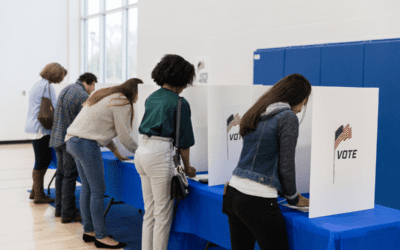
#image_title
State Sen. Lena Taylor brings name recognition, new face to mayoral race as Tom Barrett seeks his fifth term
If incumbent Tom Barrett’s tenure as Milwaukee’s mayor were a person, it could get its driver’s license this year. And in one week — provided the election is not delayed due to coronavirus — residents of Wisconsin’s largest city will decide if that tenure could eventually vote for itself.
Barrett, a bonafide Wisconsin juggernaut who was a gubernatorial candidate, U.S. representative, and state senator, has enjoyed landslide victories in each of his re-election efforts, garnering as much as 78 percent of the vote and never falling under 70 percent. But he’s never faced an opponent like State Sen. Lena Taylor before.
“She comes at it with a lot higher name recognition, higher levels of support, and probably some ability to raise money that he really hasn’t faced in the past,” said Thomas Holbrook, a distinguished professor and Wilder Crane Professor of Government at the University of Wisconsin-Milwaukee. “It’s not going to be a walk in the park necessarily.”
Taylor, who has represented much of the city’s north side since 2003 — first as a state representative, then as a state senator — has a serious opportunity to take advantage of African American support as voter mobilization efforts ramp up in brown and black neighborhoods, the latter making up the city’s largest demographic. About 39 percent of Milwaukee’s roughly 600,000 residents are black, while about 35 percent are white, according to Census Community Survey estimates.
“I don’t have a million dollars yet like the mayor, but I have more than a million dollars of name recognition and of service to this community,” Taylor said in an early March interview at her campaign office. Barrett had about $900,000 cash on-hand as of his most recent filing, while Taylor had just under $7,300, records show.
Barrett’s past success and his natural incumbent advantage — along with the upcoming Democratic National Convention and ongoing $5 billion downtown development boom — essentially makes this his race to lose, Holbrook said, but that does not mean the mayor isn’t vulnerable in some ways.
Taylor is targeting the persistent racial inequality in the city. Even as downtown has seen a rebirth, those good fortunes have not spread equally to many neighborhoods.
Milwaukee has been among the worst cities for black Americans to live in for years, according to annual Census data analysis by 24/7 Wall Street, a prominent financial news and opinion website. In 2019, Milwaukee topped the list. Brookings Institute named Milwaukee as the most segregated metropolitan area in the country. The Milwaukee Police Department for years engaged in racist practices echoing New York City’s egregious stop-and-frisk policy under Barrett’s watch. And the city’s Health Department is under criminal investigation for its handling of lead abatement.
Taylor’s own teenage son was a victim of racial profiling in 2015, when police detained him while he was delivering a bagged-up frozen turkey to a nearby family. Barrett, she said, never apologized for the officers’ actions. By contrast, he issued a public apology after police used a Taser on Bucks player Sterling Brown for parking across two handicapped-reserved spots.
“When the leader doesn’t say it for the average boy or girl, but can say it for the million-dollar employee for the billion-dollar people … that is a reflection of the lack of value that he shows for the people that had been harmed in this community for decades,” Taylor said.
But in response to the ongoing issues, the city under Barrett formed a committee to build connections between police and the black community; appointed Chytania Brown, a black woman, to head Employ Milwaukee; and bolstered lead abatement efforts for water lines and paint.
“I want to make it the best city in America for African Americans,” Barrett said. “I want to make it the best city in America, period. And I think you do that by being, first of all, inclusive, by not pitting people against each other.”
Barrett touted his ability to secure Milwaukee’s recent economic growth through the allocation of local and federal funds in the absence of state aid. He asserted that Taylor should have done more in the state Senate to bring money back to her district.
Barrett also defended the heavy downtown investment, saying new development there is necessary to help the rest of the city.
“Downtown comprises about three, three-and-a-half percent of the land of the city, yet it produces 22 to 23 percent of the taxes,” he said. “So, if you want to have libraries in the central city or if you want to have fire services on the west side or police protection on the south side, it’s good to have a healthy downtown.”
The local alt-weekly newspaper, Shepherd Express, endorsed Barrett in the primary, calling him “a steady and incorruptible leader,” and the Human Rights Campaign endorsed him this month, lauding his advocacy for the LGBTQ community.
The Milwaukee Courier, the city’s newspaper of record for the black community, and for which Taylor is a frequent op-ed contributor, did not explicitly endorse Barrett, but this month praised his leadership and efforts to turn impoverished neighborhoods around.
One notable organization whose voice is missing from the race is Black Leaders Organizing for Communities, or BLOC, which has gained national acclaim for its efforts to mobilize and register black voters in north-side neighborhoods following poor turnout in 2016.
BLOC issues endorsements, but will not be endorsing in the mayoral election, despite staff having interviewed Barrett and Taylor, said Angela Lang, BLOC’s executive director and founder.
“We met and that was a source of contention, and we just couldn’t reach a decision on what we should do,” Lang said. “People were split.… At the same time, we’re encouraged and we’re excited at the thought of being able to elect our first black mayor.”
Because of this, Taylor has “a fighting chance” of toppling Barrett, Lang said.
“Senator Taylor has a very strong base, and a very loyal base,” Lang said.
While it remains to be seen whether Barrett’s handling of the coronavirus pandemic will affect the outcome of the race, he made sure the city was prepared before coronavirus reached it, has given frequent updates — even in self-quarantine — and issued a stay-at-home order before Gov. Tony Evers.
As of Tuesday morning, the city had 531 of the county’s 673 cases, at least seven of its ten deaths, and a significant share of all the state’s deaths from COVID-19.
“If it seems to be handled well (in the eyes of voters), credit goes to him,” Holbrook said. “If it … gets much worse than people expected, blame will in part go to him as well.”

Opinion: Many to thank in fair maps victory for Wisconsinites
On February 19, 2024, Governor Tony Evers signed into law new and fair state legislative maps, bringing hope for an end to over a decade of...

Opinion: Empowering educators: A call for negotiation rights in Wisconsin
This week marks “Public Schools Week,” highlighting the dedication of teachers, paras, custodians, secretaries and others who collaborate with...

Op-ed: Trump’s journey from hosting The Apprentice to being the biggest loser
Leading up to the 2016 election, Donald Trump crafted an image of himself as a successful businessman and a winner. But in reality, Trump has a long...

Not just abortion: IVF ruling next phase in the right’s war on reproductive freedom
Nearly two years after the US Supreme Court overturned Roe v. Wade, another court is using that ruling to go after one of the anti-abortion right’s...




